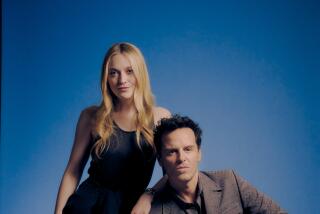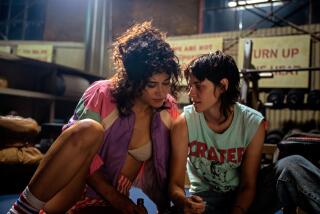Don’t say anything about ‘The One I Love’
Be aware: There is a twist. And maybe also a twist on the twist, depending on interpretation. But “The One I Love” is not intended as some trick film or gimmick movie. Rather, it is a seriocomic look at the struggle to make relationships work while maintaining a sense of personal identity. It’s like a rom-com served with a side of sci-fi.
Directed by Charlie McDowell and written by Justin Lader, the film opens in theaters Friday and is already available via on-demand platforms. Elisabeth Moss and Mark Duplass star as a married couple who are pretty much on the brink of splitting up. As a last-ditch effort to work out their problems, their therapist sends them to an idyllic, remote retreat. Then things get weird, and maybe a little magical.
The surprisingly respectful attitude toward not spoiling the surprises of the storytelling began with the first reviews after the film’s Sundance premiere. Variety called it “a pleasure to watch but a challenge to discuss.” Duplass, an executive producer on the film along with his brother Jay Duplass, noted that after the film was acquired by distributor Radius-TWC, test screenings were done with one audience knowing the surprises and the other not knowing. The level of enthusiasm was much higher from audiences who didn’t know what they were walking into.
“I can’t believe it,” McDowell said of the care people have taken to not give away the film’s secrets. “I feel like at a certain point it got to where if you did do it, you’re the jerk. We thought we’d get to Sundance and the only true experience of the movie would be the premiere. Then it became this thing of ‘I can’t tell you, so just see it.’”
McDowell, 31, attended Crossroads school in Santa Monica, then Chapman University in Orange and the American Film Institute in L.A. He had been working as a for-hire screenwriter in Hollywood while trying to get a project of his own off the ground with writing partner Lader. Along the way he also started a popular Twitter feed, “Dear Girls Above Me,” chronicling his annoying neighbors, which then became a book.
McDowell’s parents are Malcolm McDowell and Mary Steenburgen, and his stepfather is Ted Danson, who appears in the film as the therapist. (McDowell’s girlfriend is actress Rooney Mara.) He said his background can be “both a blessing and a curse” in that many people assume it helps him more than it does.
“You’re being associated with someone else,” he said, but his natural inclination is: “I want to be different. I want this to be my own thing.
“So the idea of making a movie that you couldn’t put in a neat little box, that was the most challenging thing. It’s not like my version of something else. You’re trying to get all these people on board with something that doesn’t really have a definition.”
The story of the film came about after McDowell met Duplass and the two hit it off, looking for a way to collaborate. Duplass sent McDowell an email with just a few lines, a bare sketch of an idea. Lader wondered if the message had been cut off. McDowell and Lader then came back with a fuller idea based largely around shooting at a location available to them in Ojai. Duplass told them they were greenlit; he would fund the movie himself.
“I viewed it as a zero risk proposition,” Duplass said. “I’m not financing it to get rich off of it. I’m financing it to guarantee the creative freedom of the movie.”
The film was shooting in April of last year just a few months after Duplass sent McDowell those first lines. Shot in just 15 days, the production moved quickly, with people working on the film also staying at the house that was the main location.
“The speed is important,” added Duplass. “It’s making the movie while you’re still in the launching phase of the movie. If you can make it during that time, the positive energy and the pump that’s there, as opposed to five years later when you don’t even like the script anymore and you aren’t the same person who wrote it, that’s crucial.”
Lader had written what he referred to as a 50-page “scriptment,” which was like a script minus the dialogue. The actors would then come up with the lines themselves. Danson compared it to the process when he appeared on TV’s “Curb Your Enthusiasm.” Lader was also writing during production, tailoring the story and scenes as they went. At times Duplass would incorporate lines of exposition into lines of dialogue.
“We didn’t have the luxury to find the scene by improvising,” Lader said, “so I’d write the next day’s scenes the night before. Even if they didn’t use it or only used some of it, it was useful because it gave us a starting point.”
McDowell and editor Jennifer Lily worked hard to excise anything that felt too loose or improvisational, being conscientious to make the finished film feel as structured as possible.
Protecting the film’s surprises has become its own talking point as the film has neared release, and it has steered conversations about the film toward the larger ideas of the story regarding relationships and identity rather than the beat-by-beat synopsis of the plot.
“I’m terrified I might give something away,” Danson said. “It’s a hard film to talk about, but when it’s over you do want to talk about it. You walk out thinking, ‘Whoops, am I doing my relationship as well as I can?’”
As for how it all adds up ...
“I’ve heard the weirdest theories,” McDowell said. He’s happy that many audiences have seemed so willing to engage with the film in their own way.
“But that just means we’ve opened it up enough that every individual brings their baggage into this movie and that’s how you look at what happens,” McDowell said. “And that’s kind of the coolest part for me of the whole process. We’re not spoon-feeding you what it’s about. We’re letting you bring your own experience to it, and we’re going to leave it up to you. My answer is sort of irrelevant.”
mark.olsen@latimes.com Twitter: @indiefocus
More to Read
Only good movies
Get the Indie Focus newsletter, Mark Olsen's weekly guide to the world of cinema.
You may occasionally receive promotional content from the Los Angeles Times.







